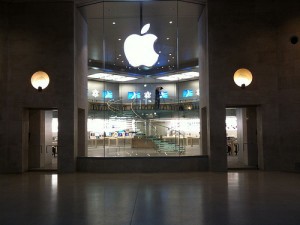Working at Apple Store No Different From Other Retail Stores, Really

Not long after the class-action lawsuit was filed, a technician named Kevin Timmer who worked at the Woodland Mall store in Grand Rapids, Mich., noticed an added step when he logged onto a computer to punch out of work.
“This window popped up and it said something like, ‘By clicking this box I acknowledge that I received all my breaks,’” Mr. Timmer recalled. “The rumor was that was because some guy in California had sued.”
Mr. Timmer said he and other technicians in the store clicked the box even when they didn’t take any breaks. It wasn’t because management insisted they stick around. It was that any down time would slam already overburdened colleagues with even more work.
“We were all in the trenches together,” he said. “Nobody wanted to leave.”
Unlike salespeople who work at AT&T and Verizon, Apple employees don’t get paid on commission, and they’re usually comprised of young, college-educated recent grads who don’t mind getting paid an hourly wage that’s “better than the Gap, though slightly less than Lululemon.” But this story, which is essentially, “employees at big, successful retail company aren’t paid very well,” is just representative of what it’s like to work in retail in general. It gets 4,000 words in the Times because Apple makes a ton of money (unlike a brand like the Gap, which has been struggling in recent years), and should be a better model of how a successful retail establishment should be.
Those of us who’ve worked in retail have all been there, right? We’ve not taken our 10-minute breaks because the store is too busy, and sitting in a dingy break room in the rear of the store can be sad, and pointless. We’ve sold membership cards, or encouraged customers to sign up for terrible credit cards without receiving a commission, but did it anyway because it was part of the job. We grew increasingly frustrated and quit because most of us didn’t want a career in retail, and those of us that did wanted to be managers or to be transferred to the corporate side, not salespeople on the floor.
On our last days of work, we’d drive or walk away and think, “we’re free, we’re free, we’re free.”
Support The Billfold
The Billfold continues to exist thanks to support from our readers. Help us continue to do our work by making a monthly pledge on Patreon or a one-time-only contribution through PayPal.
Comments